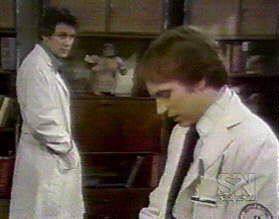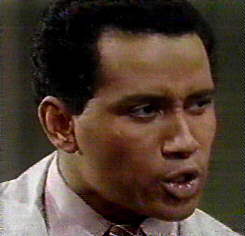Seneca, Bucky, and Clem Discuss Letting Nell Die
(February 1976)(Seneca and Bucky have just finished meeting with a specialist who has been flown in. He leaves, and Seneca and Bucky are alone in Seneca's office.)
BUCKY: Seneca, when you decided to try sur...
(Seneca holds up his hand to tell him to stop.)
BUCKY: No, let me finish. Look, we've both been all twisted up inside with love and tears and medicine and (shrugs) EEG tapes...
BUCKY: ...all jumbled up inside. It's okay. Now we've had a cold, objective opinion, and cold objectivity has told us what the chances are for Nell, and I think we have to be just as cold and objective about what led up to this. Now, come on, you had good reasons for operating - good, sound, practical medical reasons. There was a chance, an outside possibility that the aneurysm was operable. There was also a chance that you could pull Nell through that operation, agreed?
SENECA: A very small chance.
BUCKY: It was there! Look, a chance with surgery, absolutely no chance without it. Without it, she would have been gone in a matter of minutes. So there you were, left with the choice of taking that chance, or watching her die without trying to save her.
SENECA: But the fact remains, Bucky, that I've done this to her, you see. I put Nell in a state of living death.
BUCKY: Look, suppose it weren't Nell, suppose it were someone else, you might have tried the operation and the results might have been the same, but you wouldn't have felt this sense of self-recrimination.
SENECA: But it is Nell, and nothing is going to change. I've done this to her, Bucky, and it's up to me to undo it.
(Bucky is stunned.)
SENECA: The thought's crossed our mind a hundred times already.
BUCKY: (turning away) Yeah.
SENECA: I could take Nell off life-support and let her go.
BUCKY: Yeah.
SENECA: You know it's what she'd want.
BUCKY: (burying his head in his hand) Yeah, yes I do, of course I know. Could you just give me a minute? (pauses, then turns back around) Right, we both know that's what Nell would want. She said so at least a dozen times.
SENECA: It's either that, or leave her like this for years. Leave her to grow old this way, Bucky - grow old, without peace. Not life, just age.
BUCKY: No, not like that.
SENECA: I made her a promise, Bucky. I've got to keep that promise.
BUCKY: Seneca, I agree that that's what Nell would want, but you can't do it. You're not even the physician of record.
SENECA: No, that's true, technically Clem Moultrie's Nell's physician.
BUCKY: Well then Clem's the only person who can take Nell off life support. I mean, you can't terminate another doctor's patient, especially when the termination would be fatal.
SENECA: You're right. A doctor cannot do that to another doctor's patient, but a husband can do that for his wife.
BUCKY: You must know the risk you'd run.
SENECA: Yes, but what about the risk Nell took, trusting me with the promise not to let this happen?
BUCKY: Forget about the promise for a second...
SENECA: (outraged) Forget the promise?
BUCKY: Look, I know what it means, you know what it means, but I'm not sure its meaning would be clear to a jury!
(He suddenly stops, realizing what he's just said.)
BUCKY: Look, we're not nearly there yet. We haven't talked to Clem. Maybe, maybe he'll do it. (nods)
SENECA: What if he says no?
BUCKY: I don't know, but I think you should ask him anyway.
SENECA: It's certainly not doing him any favors, is it - a husband, a doctor, his superior all asking him to take his patient off life support?
BUCKY: Even so.
SENECA: (nods) Alright, Bucky, maybe we can work something out, but I made a promise, and somehow, I'm going to keep it.
(In the next scene, Seneca is looking out the window when there is a knock at the door.)
SENECA: (pauses) Come in.
CLEM: (entering) I'm sorry, I just got the message that you wanted to see me.
SENECA: That's alright, they tell me you had a patient recovering.
CLEM: Yeah.
SENECA: Ah, would you shut the door, please? (Clem does, then Seneca motions to the chair.) Sit down.
CLEM: (sitting) Thank you, I don't mind if I do. So, what's going on?
SENECA: Ah, Dr. Hagen saw Nell.
CLEM: What did he have to say?
SENECA: Just what we knew he'd say.
CLEM: Well, I'm sorry.
SENECA: (trying to be matter-of-fact) Alright, okay, now I'm satisfied that nothing can be done, medically. Massive brain damage has impaired the basic functions and there's really nothing that can be done. (rubbing his eyes) At the same time, she is in superb physical condition, and that means that she could go on for years in a vegetative state.
CLEM: I'm afraid I have to agree.
SENECA: I don't think I want that to happen. I want you, as doctor of record, to take Nell off life support.
CLEM: Are you saying that as the patient's husband or as the head of this department?
SENECA: Come on, Clem, you know me better than that. For the record, I'm asking as Nell's husband.
CLEM: Well as Nell's friend - and your friend - I understand, and I sympathize. But as a doctor...
SENECA: Yes?
CLEM: I can't see how I'm gonna do that.
CLEM: Now, let me try to work my way through this. Okay, now if I had been in charge when Nell stopped breathing, if we had had the EEG at that moment, we would have known what her condition was and I wouldn't have ordered a respirator; neither would you. Am I right?
(Seneca nods.)
CLEM: But you didn't have the EEG, and you didn't know the cortex was knocked out, so you put her on life support. And you can't blame yourself for that, you really, really can't.
SENECA: (shrugs frustratedly) Well...
CLEM: So Nell is alive.
SENECA: No, you see she isn't! Not on Nell's terms.
CLEM: I can respect her defintion of life, doctor, and yours. But I, I can't make it my definition.
SENECA: Okay, Clem, I understand.
CLEM: I'm sorry. I wouldn't like this even if it happened to people I didn't know. I take my friendships very seriously. I admire you, I admire you both. It's just not easy. (gets up)
SENECA: Clem, I understand your feelings.
CLEM: (burying his head in his hands) Oh man.
SENECA: Answer me a question, will you?
CLEM: Sure.
SENECA: What would you do if Nell contracted pneumonia?
CLEM: Under the given circumstances?
SENECA: Yeah, would you treat the pneumonia?
CLEM: No.
SENECA: No? So what you're saying, in effect, is that you would not sustain the vegetative state?
CLEM: No, but to me there's a difference between that and taking her off life support.
SENECA: Oh, then would you explain it to me, because in either case, she dies.
CLEM: Down the hall, right now, in Nell's bed, in Nell's body, there is something that makes that body different than a mannequin in a store window. And that, whatever it is, is life. It's not the life she had before the aneurysm went, it's not the life we want her to have, but it is life, and as a doctor, that is what I have sworn to preserve. I cannot hold out my hand, pull a plug, and end it.
SENECA: (pointing to a plant) Clem, this plant is alive. Now Nell - or, what we knew as Nell - is down in that bed right now. Her perceptions, her expectations are more limited than this plant.
CLEM: Yes.
SENECA: Now if you knew this plant was sick or stunted, that it wasn't going to change or grow, and that it was going to require constant care just to sustain a few roots and a small leaf what would you do, doctor? Would you hesitate to pull it up?
CLEM: Probably not, but it is what is left of a human life is what we are dealing with here. (Seneca gets up and turns toward the window.) There's another consideration too, doctor.
SENECA: What's that?
CLEM: Almost everyone at Riverside knows what Nell's situation is. Word got out after her first operation last spring, right?
SENECA: Right.
CLEM: A lot of people came to care about her, to understand what she was going through, and to admire the way she got through it. Those same people are going to be very concerned with what happens to her now. There is no way Nell could be taken off life support, and the whole hospital not know about it.
SENECA: Are you saying that you're concerned about criminal charges?
CLEM: There's more than that. I'm told I have a pretty fair reputation as a resident here.
SENECA: Yes, you do.
CLEM: Which means my decisions and actions are monitored, respected, and taken seriously.
SENECA: Yes.
CLEM: Which means that I am an example for the interns and for the other residents. (pause) Seneca, I can't say by my actions that it is ethical to take life support from a patient.
CLEM: Do you know what you're asking me to do? You're asking me to define death.
(Seneca nods and sits down.)
CLEM: I'm so sorry for you. I'm so sorry for you both.







